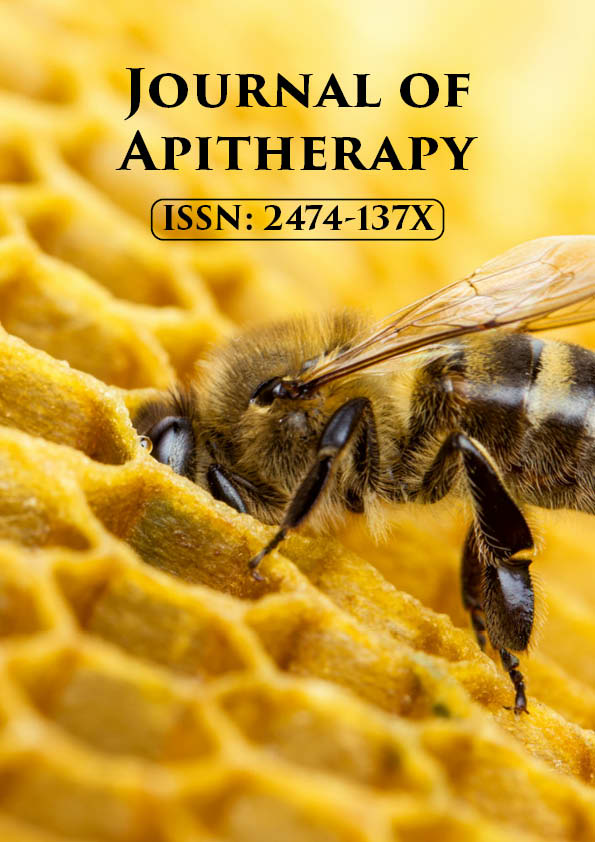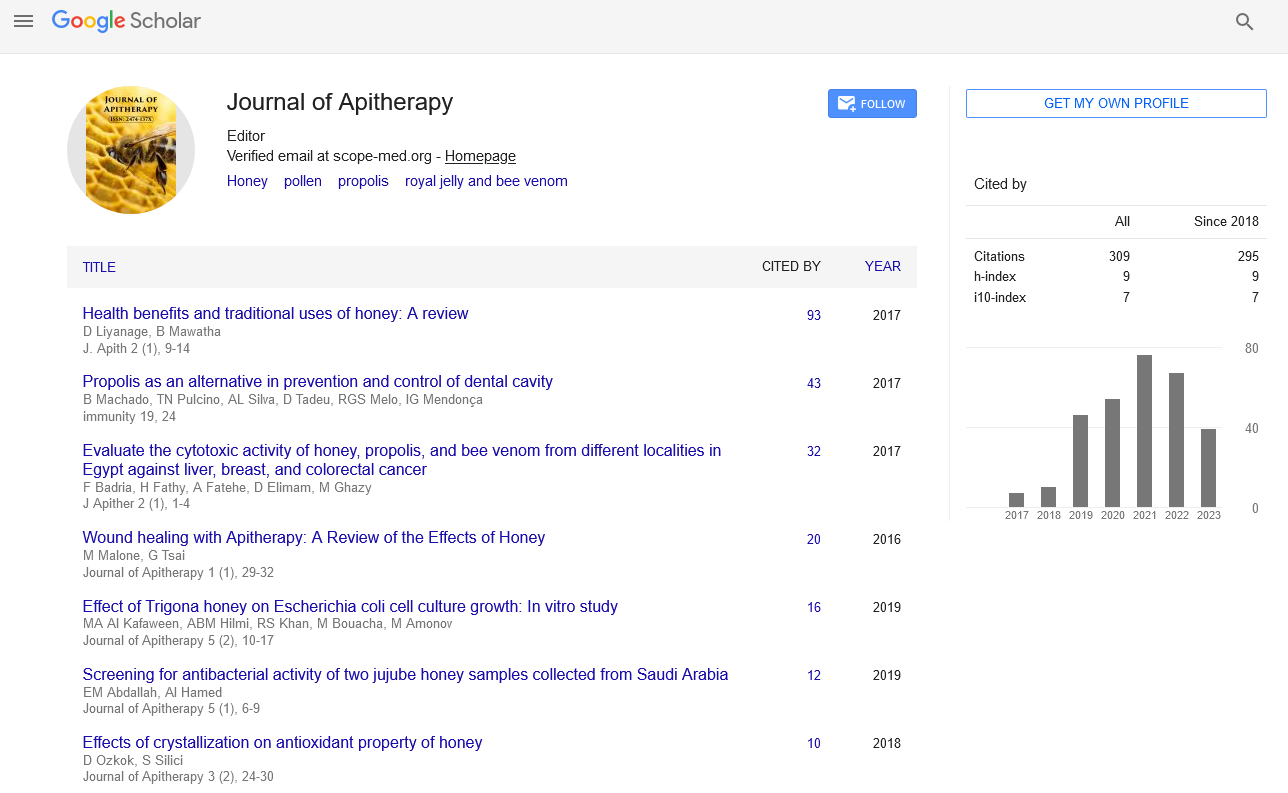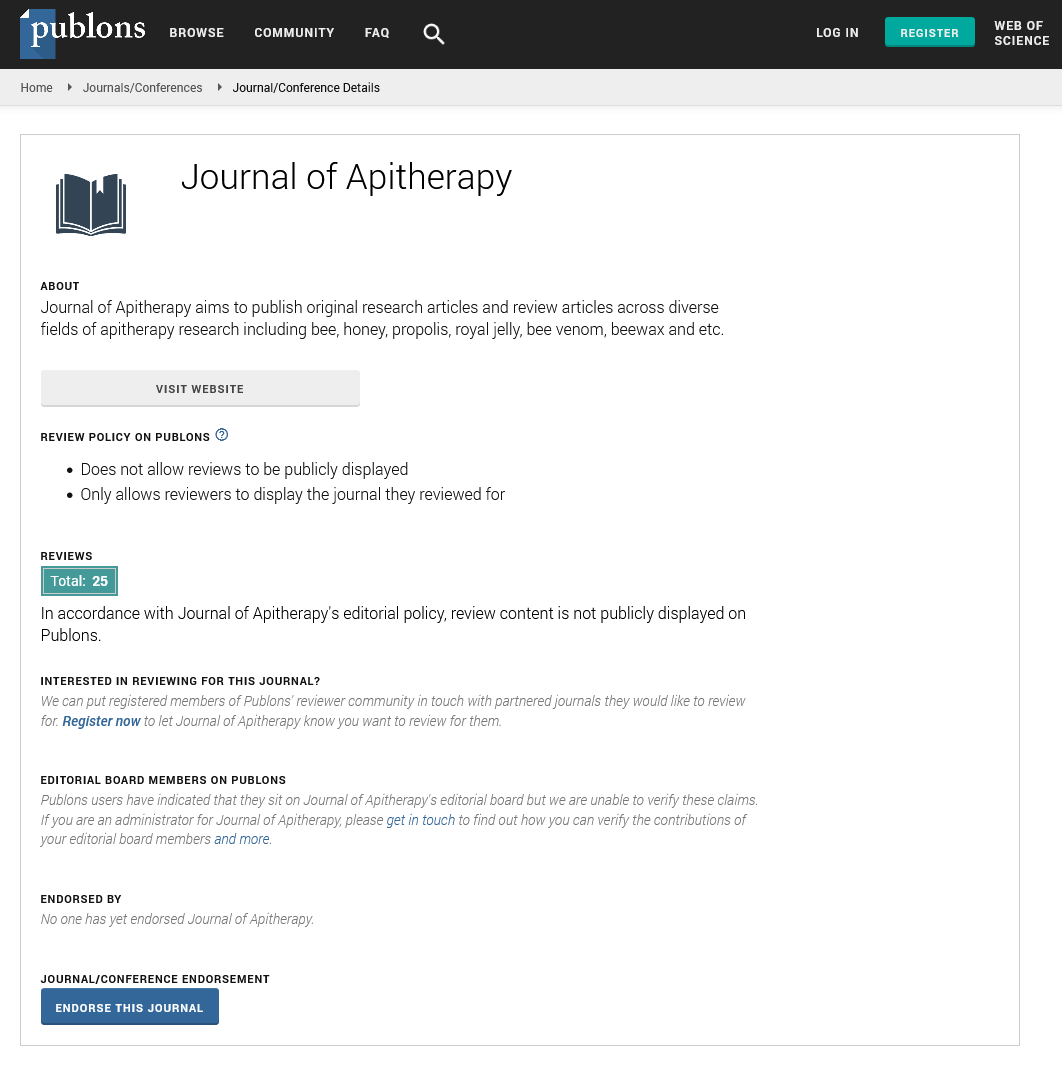Opinion Article - Journal of Apitherapy (2023)
Bee-Derived Therapies: Bridging Ancient Wisdom with Modern Apitherapy
Mahmud Khan*Mahmud Khan, Department of Pharmaceutical Sciences, University of Science and Technology Chittagong, Chattogram, Bangladesh, Email: mtekhan2002@yahoo.com
Received: 26-Jul-2023, Manuscript No. japitherapy-23-110024; Editor assigned: 29-Jun-2023, Pre QC No. japitherapy-23-110024 (PQ); Reviewed: 13-Jul-2023, QC No. japitherapy-23-110024; Revised: 20-Jul-2023, Manuscript No. japitherapy-23-110024 (R); Published: 27-Jul-2023
Description
Apitherapy, a holistic healing practice that utilizes various bee products, has captured the attention of researchers and medical professionals alike. This field of study delves into the intricate properties of bee-derived substances, ranging from honey and pollen to venom and royal jelly, in order to uncover their therapeutic potential [1, 2].
Historical foundations and contemporary interest
Apitherapy’s roots can be traced back to ancient civilizations like the Egyptians, Greeks, and Chinese, who recognized the healing properties of bee products. In recent decades, a resurgence of interest has propelled apitherapy into the spotlight of scientific investigation. Researchers are eager to understand the mechanisms underlying the reported health benefits and to discern how these substances might complement conventional medical treatments [3, 4].
Honey’s healing touch: Honey, one of the most well- known bee products, boasts a remarkable array of bioactive compounds. Research has illuminated its antioxidant, antibacterial, and anti-inflammatory properties. Studies have explored honey’s potential in wound healing, its ability to soothe coughs and sore throats, and its role in combating infections. Honey’s diverse composition, including enzymes, flavonoids, and phenolic acids, contributes to its multifaceted therapeutic effects [5].
Royal jelly: Royal jelly, a secretion reserved for the queen bee, is rich in nutrients and biologically active molecules. It has sparked interest due to its potential immunomodulatory effects and its impact on longevity. Researchers are investigating how royal jelly’s components, including proteins, lipids, and vitamins, influence cellular processes and the immune system, potentially leading to applications in immune-related disorders and aging-related studies [6].
Venom’s potential: Bee venom, although infamous for causing pain, has gained attention for its possible therapeutic applications. Its unique composition, including melittin and peptides, offers anti-inflammatory and analgesic potential. Apitherapy research explores its role in managing chronic pain conditions like arthritis and its potential in treating autoimmune disorders through its immune-modulating effects.
Pollenomics: Bee pollen, collected by bees from flowers, is a nutrient-rich substance that could hold promise as a dietary supplement. Studies delve into its vitamins, minerals, proteins, and fatty acids, seeking to understand its potential role in boosting energy, supporting the immune system, and aiding digestion. However, the allergenic potential of pollen requires careful consideration when exploring its applications.
Challenges and considerations
While apitherapy research presents exciting possibilities, challenges remain. Standardization of bee product composition and dosages, ensuring safety in vulnerable populations, and addressing ethical concerns regarding bee welfare and sustainability are paramount. Additionally, rigorous scientific studies are needed to validate anecdotal claims and establish evidence-based guidelines for apitherapeutic interventions. In the realm of apitherapy research, collaboration between traditional practitioners, scientists, and medical professionals is pivotal. Clinical trials, laboratory studies, and observational research are steadily contributing to the understanding of how bee-derived substances interact with human physiology. From exploring the potential of propolis for oral health to investigating the use of bee venom in controlled therapies, apitherapy research is shedding light on novel avenues for improving health and well-being.
References
- Dumitru CD, Neacsu IA, Grumezescu AM, Andronescu E. Bee-Derived Products: Chemical Composition and Applications in Skin Tissue Engineering. Pharmaceutics 2022;14:750.
[Crossref] [Google scholar] [pubmed]
- El-Seedi HR, Eid N, Abd El-Wahed AA, Rateb ME, Afifi HS, Algethami AF, et al. Honey Bee Products: Preclinical and Clinical Studies of Their Anti-inflammatory and Immunomodulatory Properties. Front Nutr 2022;8:761267.
[Crossref] [Google scholar] [Pubmed]
- Münstedt K, Männle H. Using Bee Products for the Prevention and Treatment of Oral Mucositis Induced by Cancer Treatment. Molecules 2019; 24:3023
[Crossref] [Google Scholar] [pubmed]
- Olas B. Bee Products as Interesting Natural Agents for the Prevention and Treatment of Common Cardiovascular Diseases. Nutrients 2022; 14:2267
[Crossref] [Google Scholar] [Pubmed]
- Münstedt K, Männle H. Bee products and their role in cancer prevention and treatment. Complement Ther Med 2020; 51:102390
[Crossref] [Google Scholar] [Pubmed]
- Luo X, Dong Y, Gu C, Zhang X, Ma H. Processing Technologies for Bee Products: An Overview of Recent Developments and Perspectives. Front Nutr 2021; 8:727181
[Crossref] [Google Scholar] [Pubmed]
Copyright: © 2023 The Authors. This is an open access article under the terms of the Creative Commons Attribution Non Commercial Share A like 4.0 (https://creativecommons.org/licenses/by-nc-sa/4.0/) This is an open access article distributed under the terms of the Creative Commons Attribution License, which permits unrestricted use, distribution, and reproduction in any medium, provided the original work is properly cited.







